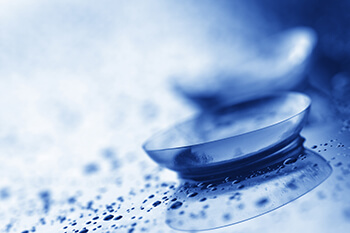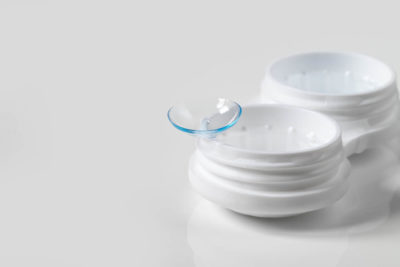 Today, more than 30 million people in the United States wear contact lenses in order to see clearly. Contact lenses offer patients the benefit of clear vision without the need of eyeglasses.
Today, more than 30 million people in the United States wear contact lenses in order to see clearly. Contact lenses offer patients the benefit of clear vision without the need of eyeglasses.
Contact lenses are a very popular option for correcting common vision problems such as nearsightedness, farsightedness and astigmatism, as well as presbyopia. They are also a useful therapeutic treatment for certain eye diseases where an irregular corneal shape may blur vision, such as keratoconus or corneal scarring.
Patients who lead an active lifestyle and/or participate in any type of sport or athletic activity such as biking, running, playing tennis or golf, skiing, sailing or really any physical activity, find that wearing contact lenses rather than eye glasses helps to make these activities even more enjoyable.
Patients who have higher prescriptions often have a difficult time tolerating the optical distortions and reflections caused by eyeglasses. This, in addition to the limited peripheral vision provided by eyeglasses, motivates a great number of people to seek contact lenses. Some patients just prefer to have a more natural appearance and feel that no matter how attractive an eyeglass frame they select, they just look better without wearing glasses.
Types of Contact Lenses
There are two major categories of contact lenses: soft contact lenses and rigid gas permeable (RGP) contact lenses. Regardless of the type of contacts that you are interested in, they require a thorough examination, a contact lens fitting, and a valid prescription. Contact lenses can be ordered right in our Honolulu office.
Within these two major contact lens categories there are a number of types of lenses for solving different vision problems:
- Soft Daily Wear Contact Lenses
- Rigid Gas Permeable (RGP) Contact Lenses
- Contact Lenses for Astigmatism
- Disposable Contact Lenses
- Specialty Contact Lenses
 Soft daily wear contact lenses are made of soft water-containing, flexible plastics, called “hydrogels”, that allow oxygen to pass to the cornea to maintain its health and clarity. Because they are soft, thin and flexible, Soft contact lenses are easier to adapt to and more comfortable than rigid gas permeable (RGP) contact lenses. Another newer type of soft contact lens is made of a “silicone hydrogel” material that allows an even greater amount of oxygen to reach the cornea, adding additional safety. Soft daily wear contact lenses require careful cleaning and disinfection, as they tend to attract deposits of protein from your tear film.
Soft daily wear contact lenses are made of soft water-containing, flexible plastics, called “hydrogels”, that allow oxygen to pass to the cornea to maintain its health and clarity. Because they are soft, thin and flexible, Soft contact lenses are easier to adapt to and more comfortable than rigid gas permeable (RGP) contact lenses. Another newer type of soft contact lens is made of a “silicone hydrogel” material that allows an even greater amount of oxygen to reach the cornea, adding additional safety. Soft daily wear contact lenses require careful cleaning and disinfection, as they tend to attract deposits of protein from your tear film.
Rigid gas permeable contact lenses (RGPs) are more durable and resistant to deposit buildup, and generally give a clearer, crisper vision. They tend to be less expensive over the life of the lens since they last longer than soft contact lenses. They are easier to handle and do not tear, however, they can break. It can take several weeks of adaptation in order to get used to wearing RGPs as compared to only a few days for soft contacts.
Contact lenses for astigmatism: People who have astigmatism usually have an asymmetrical curvature of the cornea making it oval shaped, like a football. Contact lenses that correct astigmatism are called “toric” lenses. Toric lenses are readily available in both soft contacts and rigid gas permeable contact lens prescriptions. Toric contact lenses require a greater degree of fitting expertise in order to obtain the most precise vision.
Disposable contact lenses: Today, most soft contact lenses are prescribed with a very specific “planned replacement schedule”. That is, the prescribing eye doctor will give you instructions on how frequently to replace your lenses based on your tear film, how often you may be removing the lenses and how quickly you soil the lenses, even after cleaning and disinfection. True “disposable” contact lenses are worn only once and then discarded. In order to have a “daily wear disposable schedule”, a brand new pair of lenses is used each day.
Specialty contact lenses: The vast majority of contact lenses prescribed fall into the categories as described above. There are some other types of contact lenses for some special purposes that you may wish to know about. The eye doctors at Sugiki • Portis • Yim Eye Center will help determine the best lens for your specific needs.





